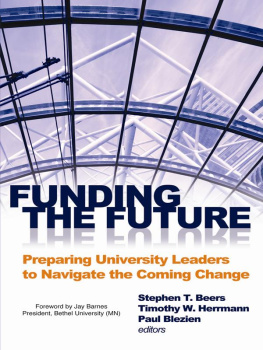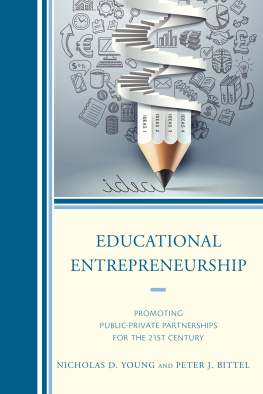Offering both candor and clarity, Funding the Future defines well the current educational landscape and the significant challenges facing institutions and those who lead them. These current realities will require bold, collaborative, and courageous leaders who are willing to step into a new future filled with both peril and possibility. The breadth and scope of expertise represented in this book is impressive and the subject matter a must read for educational leaders.
Brad Lau, Vice President for Student Life, George Fox University
I deeply value higher Christian education and I also bear the fiduciary responsibility of being a board member of a leading Christian university. From both perspectives I found Fundingthe Future challenging, motivating, and insightful.... The authors have done a masterful job of helping us think through the land mines that we can address before the crisis hits.
Roger Cross, President Emeritus, Youth for Christ/USA
Funding the Future: Preparing University Leaders to Navigate theComing Change has been assembled by seasoned and wise voices from across the higher education landscape for such a time as this. Relevant leaders must understand institutional finances, accounting rules, and decision-making models now more than ever. There is very little room for fiscal error, particularly for the majority of universities that rely heavily on tuition dollars to sustain their budgets.
Jay Barnes, president, Bethel University, St. Paul, Minnesota
FUNDING THE FUTURE
The publication of this book has been sponsered by the
Association for Christians in Student Development.
FUNDING THE FUTURE
Preparing University Leaders
to Navigate Impending Change
Stephen T. Beers
Timothy W. Herrmann
Paul Blezien
Editors
FUNDING THE FUTURE
Preparing University Leaders to Navigate Impending Change

Copyright 2012 by the Association of Christians in Student Development
ISBN 978-0-915547-852
Printed in the United States of America
ALL RIGHTS RESERVED
No part of this publication may be reproduced, stored in a retrieval system, or transmitted in any form by any meanselectronic, mechanical, photocopying, recording or otherwisewithout prior written consent.
Scripture quotations, unless otherwise noted, are from The Holy Bible, New International Version. Copyright 1984, International Bible Society. Used by permission of Zondervan Publishers.
LIBRARY OF CONGRESS CATALOGING-IN-PUBLICATION DATA
Funding the future : preparing university leaders to navigate impending change / Stephen Beers, Paul Blezien, and Tim Herrmann, Editors.
pages cm
Includes bibliographical references and index.
ISBN 978-0-915547-85-2 (alk. paper)
1. Education, Higher---United States---Finance. I. Beers, Stephen Thomas, editor. II. Blezien, Paul, editor. III. Herrmann, Timothy W., editor.
LB2342.F83 2012
338.4'3378---dc23
2012016285
Cover design by Rick Gibson
Interior text design by Sandy Armstrong
For information contact:
Abilene Christian University Press
1626 Campus Court
Abilene, Texas 79601
1-877-816-4455 toll free
www.abilenechristianuniversitypress.com
Foreword
The fall of 2008 brought a sea change in the country and in higher education. Assumptions held for years seemed no longer to be valid. The combination of significant demographic shifts and a changing economy notified leaders that a new normal was emerging. Early in 2008 would have been a good time to retire, but by the fall retirement accounts were shaken. Delayed retirements, increased pressure on financial aid, and rising fuel costs were among the many internal factors shaping this new normal. Collaboration and trustobvious goals in campus decision makingwere strained by the necessity to make hard choices about programs and personnel.
Funding the Future: Preparing University Leaders to Navigate theComing Change has been assembled by seasoned and wise voices from across the higher education landscape for such a time as this. Relevant leaders must understand institutional finances, accounting rules, and decision-making models now more than ever. There is very little room for fiscal error, particularly for the majority of universities that rely heavily on tuition dollars to sustain their budgets.
Leaders often cite the need to make mission-centered decisions. But when financial pressures arise, the meaning of mission-centered lies in the eye of the beholder. Times like these challenge institutions to define more clearly what is at the core of the mission as opposed to what may be a secondary good. Defining what is core must involve a collaborative campus discussion that will include trustees, as keepers of the mission, along with the faculty, staff, and administrators who will carry it out.
Chapter after chapter, this text is filled with thoughtful and practical advice for leaders in higher education. Finding better ways to discern collaboratively, sharpen the mission, gracefully care for people, and deepen our understanding of influential cultural trends is paramount to our future success and stability. The wisdom provided by these authors will help leaders in higher education do just that.
So, pray hard, breathe deeply, and grab all the wisdom you can from these good people! Youll be glad you did!
Jay Barnes, President
Bethel University
St. Paul, Minnesota
Acknowledgements
As is so often the case, credit for this publication is due to many more individuals than those showing up on the list of authors and we want to acknowledge some of these contributions and express our gratitude.
First, we thank the Association for Christians in Student Development for their generous support of this project. Without their initial encouragement and accompanying grant it would have been impossible even to initiate the work. We are also grateful for the guidance and encouragement of the executive committee. Their willingness to invest in this manuscript was not only critical to the authors but also demonstrates an organizational vision for providing resources that will help their members to more effectively lead and manage on their campuses.
Of course the greatest credit for the completion of this project is due those who agreed to author the various chapters. Each was selected because of the unique experience and valuable perspective that they bring to this work. We are humbled that the members of this very select group were willing to offer their time, knowledge, and wisdom to this effort.
The original research conducted for this project was a significant undertaking and, of course, involved a number of persons. Although we cannot disclose their identities, we are very grateful to the senior administrators who were willing to participate in the interview process that provided the data for this study. We are grateful that they were willing to invest the time and effort required. It is fair to say that they did so out of a desire to share their own experience and to help others to do their work more excellently. We also want to acknowledge Eileen Hulme of Azusa Pacific University for her technical assistance in the qualitative research design. This help was extremely valuable and without it we are certain that the resulting product would not have been as worthwhile.










